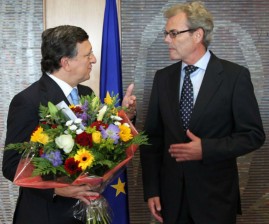Crisis-torn EU wins 2012 Nobel Peace Prize

European Union Commission President Jose Manuel Barroso,(L), receives flowers from Norway’s Ambassador to the EU Atle Leikvoll after the European Union was awarded the 2012 Nobel peace prize, at the EU Commission headquarter in Brussels on October 12, 2012. “The union and its forerunners have for over six decades contributed to the advancement of peace and reconciliation, democracy and human rights in Europe,” Nobel Committee president Thorbjoern Jagland said in Oslo. AFP Photo/Thierry Charlier
OSLO — The Nobel Peace Prize was on Friday awarded to the European Union, an institution wracked by the euro crisis but credited with bringing more than a half century of peace to a continent ripped apart by two world wars.
“The union and its forerunners have for over six decades contributed to the advancement of peace and reconciliation, democracy and human rights in Europe,” Nobel Committee president Thorbjoern Jagland said in Oslo.
Shortly after the prize announcement, European Union President Herman Van Rompuy and European Commission president Jose Manuel Barroso described the award as “a tremendous honour”.
“This prize is the strongest possible recognition of the deep political motives behind our Union: the unique effort by ever more European states to overcome war and divisions and to jointly shape a continent of peace and prosperity,” they said in a joint statement.
The prize, they said, was “not just for the project and the institutions embodying a common interest, but for the 500 million citizens living in our union.”
Article continues after this advertisementBut online, the Nobel Committee’s decision to hand the prize to a union of states currently wracked by a severe financial crisis, sparked strong reactions from some on Twitter.
Article continues after this advertisement“Anti-austerity protests in Portugal, Spain, Greece, Italy & France, Nationalism, Fascism, unemployment and poverty. Yeah EU deserves it!” @AnonOpGreece said on Twitter.
The prize for the EU came as a surprise at a time when European solidarity is facing its most daunting challenge in decades amid deep rifts between a south drowning in debt and a wealthier north, led by Germany, only reluctantly coming to the rescue.
Whether or not that begrudging assistance will keep the European project afloat remains to be seen, but the deep crisis has broadened the gulf already felt between citizens in the different member states and a Brussels long seen as too distant and bureaucratic.
“The EU is currently undergoing grave economic difficulties and considerable social unrest,” Jagland acknowledged on Friday, stressing that the Nobel jury had wanted “to focus on what it sees as the EU’s most important result: the successful struggle for peace and reconciliation and for democracy and human rights.”
The creation of the organisation is credited with helping to bring peace and stability to the war-torn continent by bringing together arch-enemies France and Germany and herding them down the same path.
German Chancellor Angela Merkel, who faces harsh criticism from debt-laden southern Europe for fronting the push for punishing austerity measures, on Friday hailed the EU’s win and insisted efforts to save the euro were also aimed at ensuring peace on the continent.
“The euro is more than a currency because at the end of the day it is about the original idea of a union of peace and of values,” she told reporters.
Despite recurring difficulties, the EU has become the biggest common market in the world, allowing free circulation of goods, people, services and capital.
Over the years, the pioneering project has swelled to encompass 27 countries which not long ago sat on either side of the “iron curtain”.
They came to the table with vastly different economic, social and cultural situations, but following intense integration efforts, a full 17 of them now share a common currency.
This year’s prize also comes as a bombshell in host country Norway, which itself has rejected joining the union twice, in 1972 and 1994, and where three quarters of the inhabitants today say they are opposed to membership, according to recent polls.
Committee president Thorbjoern Jagland, who is also the secretary general of the Council of Europe and a fervent EU supporter, told reporters Friday he did not see why the prize pick should be controversial in Norway.
“It is possible to be opposed to Norwegian EU membership and at the same time acknowledge the peace-creating role EU has had in Europe,” he said.
In that vein, Norwegian Prime Minister Jens Stoltenberg congratulated the EU for its win, but said his country still had no plans of joining the bloc.
“This peace prize does not change the situation when it comes to Norway’s relationship to the EU,” he said, adding: “membership is not on the agenda.”
Despite the bloc’s deepening difficulties, its tumultuous history shows that, until now at least, the EU has always managed to survive crises, often strengthening its integration in the process.
The nod to the EU this year can be seen as an effort by the Nobel Committee to rectify a historic oversight: most experts agree that after Gandhi, who died without receiving the honour, the European project is the most noticeable hole in the Nobel family tree.
It remains unclear who will collect the Nobel for the EU, which is the 21st institution to ever take the prize since 1901.
The award, consisting of a gold medal, a Nobel diploma and 8.0 million Swedish kronor ($1.2 million, 930,940 euros), will be handed over at a ceremony in Oslo on December 10.
Last year’s prize was split between Liberian President Ellen Johnson Sirleaf, compatriot “peace warrior” Leymah Gbowee and Yemen’s Arab Spring activist Tawakkul Karman.